Intercultural Competence in Business: Cultural Autobiography, Similarities and Differences, and Cultural Frameworks for Evaluation
VerifiedAdded on 2023/06/18
|10
|2607
|491
AI Summary
This article discusses intercultural competence in business, covering topics such as cultural autobiography, similarities and differences, and cultural frameworks for evaluation. It emphasizes the importance of self-analysis and provides insights into managing intercultural competence in global organizations.
Contribute Materials
Your contribution can guide someone’s learning journey. Share your
documents today.
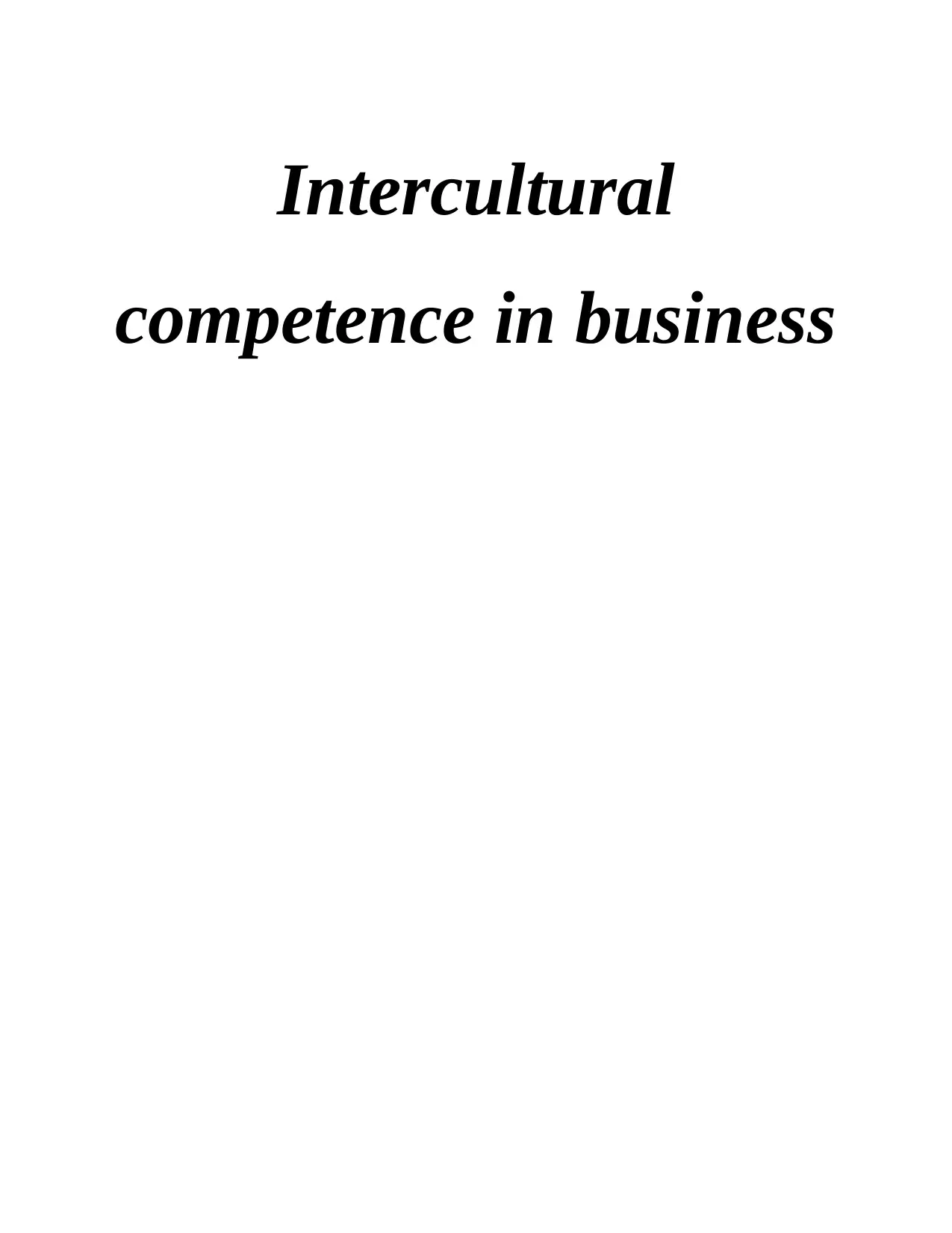
Intercultural
competence in business
competence in business
Secure Best Marks with AI Grader
Need help grading? Try our AI Grader for instant feedback on your assignments.
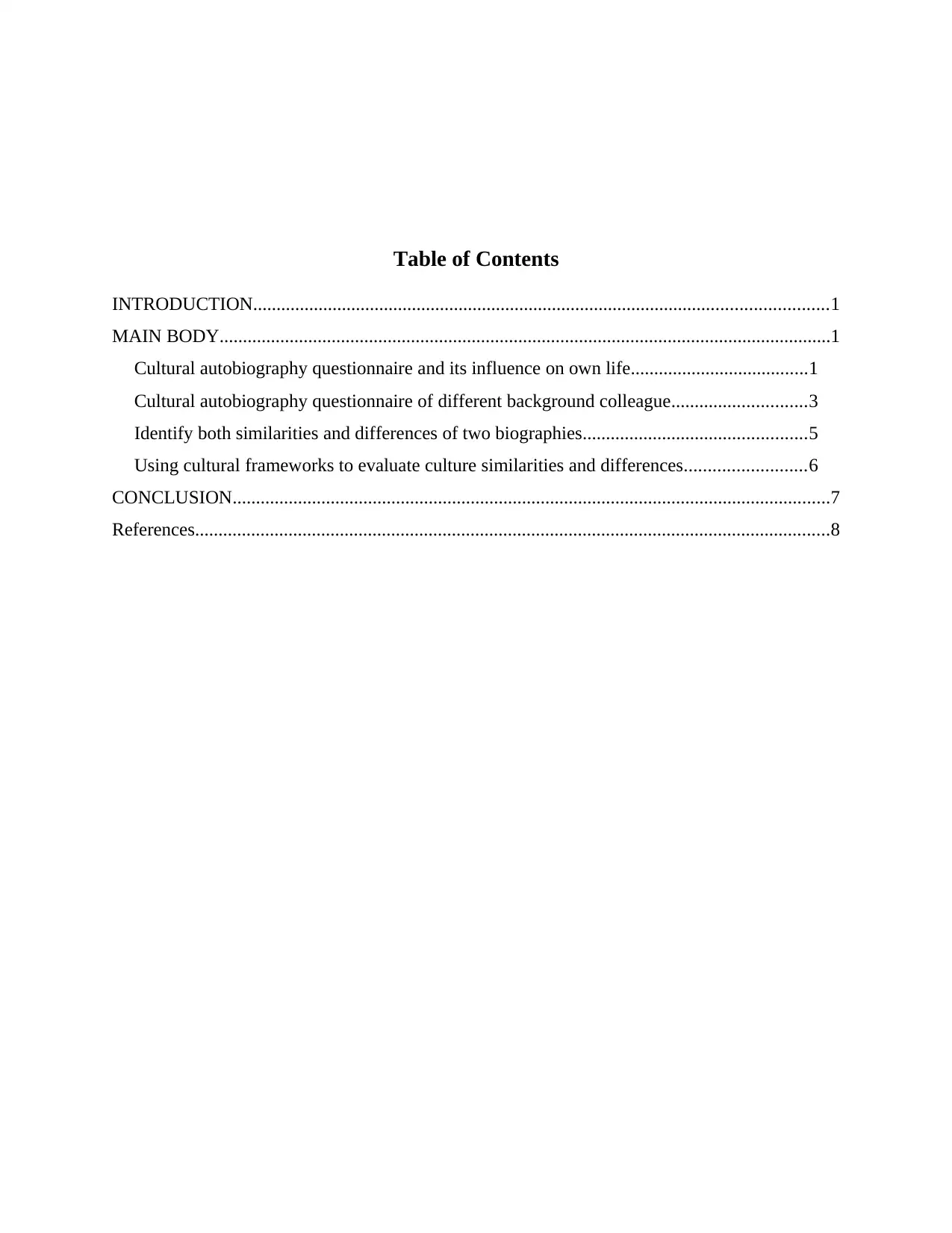
Table of Contents
INTRODUCTION...........................................................................................................................1
MAIN BODY...................................................................................................................................1
Cultural autobiography questionnaire and its influence on own life......................................1
Cultural autobiography questionnaire of different background colleague.............................3
Identify both similarities and differences of two biographies................................................5
Using cultural frameworks to evaluate culture similarities and differences..........................6
CONCLUSION................................................................................................................................7
References........................................................................................................................................8
INTRODUCTION...........................................................................................................................1
MAIN BODY...................................................................................................................................1
Cultural autobiography questionnaire and its influence on own life......................................1
Cultural autobiography questionnaire of different background colleague.............................3
Identify both similarities and differences of two biographies................................................5
Using cultural frameworks to evaluate culture similarities and differences..........................6
CONCLUSION................................................................................................................................7
References........................................................................................................................................8
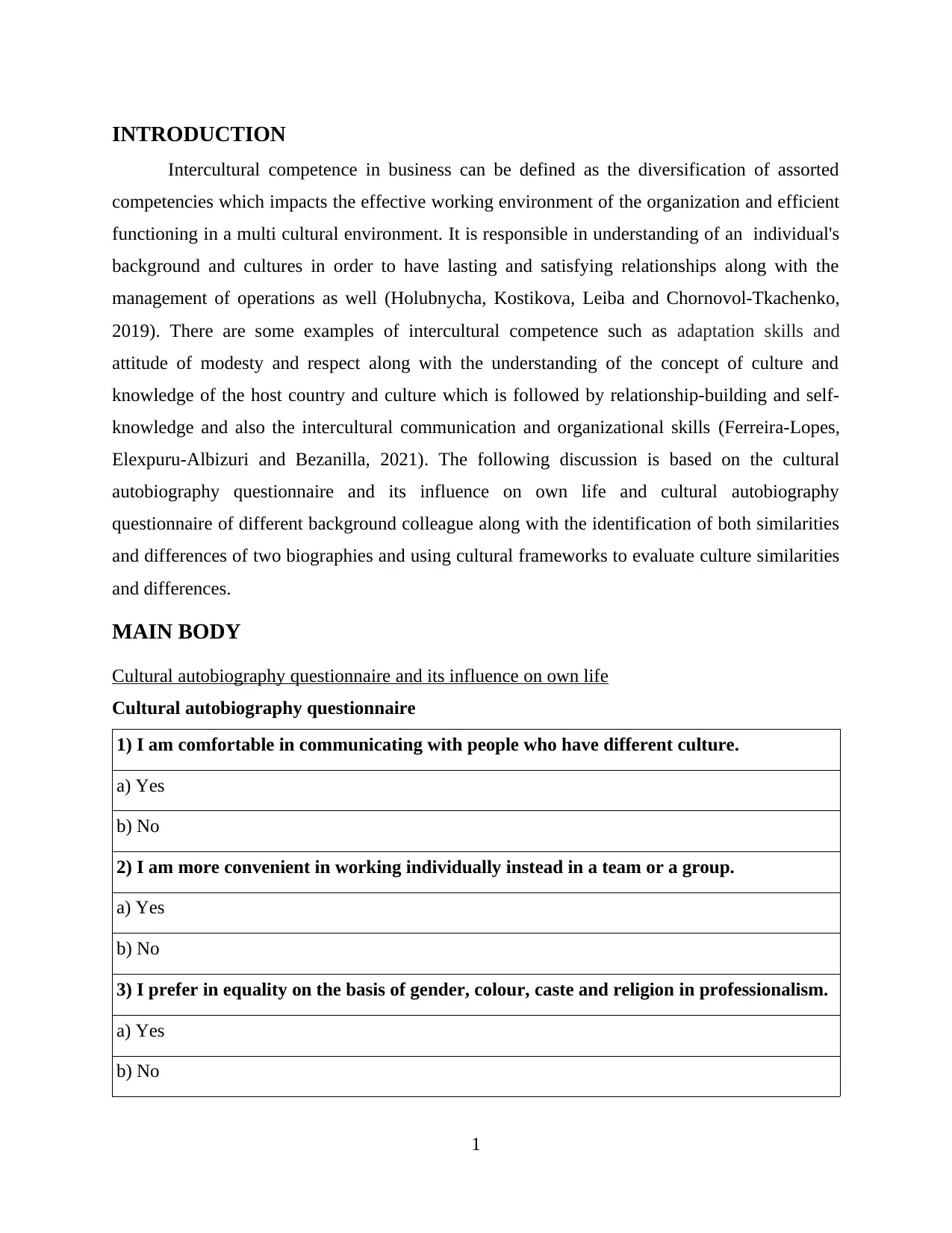
INTRODUCTION
Intercultural competence in business can be defined as the diversification of assorted
competencies which impacts the effective working environment of the organization and efficient
functioning in a multi cultural environment. It is responsible in understanding of an individual's
background and cultures in order to have lasting and satisfying relationships along with the
management of operations as well (Holubnycha, Kostikova, Leiba and Chornovol-Tkachenko,
2019). There are some examples of intercultural competence such as adaptation skills and
attitude of modesty and respect along with the understanding of the concept of culture and
knowledge of the host country and culture which is followed by relationship-building and self-
knowledge and also the intercultural communication and organizational skills (Ferreira-Lopes,
Elexpuru-Albizuri and Bezanilla, 2021). The following discussion is based on the cultural
autobiography questionnaire and its influence on own life and cultural autobiography
questionnaire of different background colleague along with the identification of both similarities
and differences of two biographies and using cultural frameworks to evaluate culture similarities
and differences.
MAIN BODY
Cultural autobiography questionnaire and its influence on own life
Cultural autobiography questionnaire
1) I am comfortable in communicating with people who have different culture.
a) Yes
b) No
2) I am more convenient in working individually instead in a team or a group.
a) Yes
b) No
3) I prefer in equality on the basis of gender, colour, caste and religion in professionalism.
a) Yes
b) No
1
Intercultural competence in business can be defined as the diversification of assorted
competencies which impacts the effective working environment of the organization and efficient
functioning in a multi cultural environment. It is responsible in understanding of an individual's
background and cultures in order to have lasting and satisfying relationships along with the
management of operations as well (Holubnycha, Kostikova, Leiba and Chornovol-Tkachenko,
2019). There are some examples of intercultural competence such as adaptation skills and
attitude of modesty and respect along with the understanding of the concept of culture and
knowledge of the host country and culture which is followed by relationship-building and self-
knowledge and also the intercultural communication and organizational skills (Ferreira-Lopes,
Elexpuru-Albizuri and Bezanilla, 2021). The following discussion is based on the cultural
autobiography questionnaire and its influence on own life and cultural autobiography
questionnaire of different background colleague along with the identification of both similarities
and differences of two biographies and using cultural frameworks to evaluate culture similarities
and differences.
MAIN BODY
Cultural autobiography questionnaire and its influence on own life
Cultural autobiography questionnaire
1) I am comfortable in communicating with people who have different culture.
a) Yes
b) No
2) I am more convenient in working individually instead in a team or a group.
a) Yes
b) No
3) I prefer in equality on the basis of gender, colour, caste and religion in professionalism.
a) Yes
b) No
1
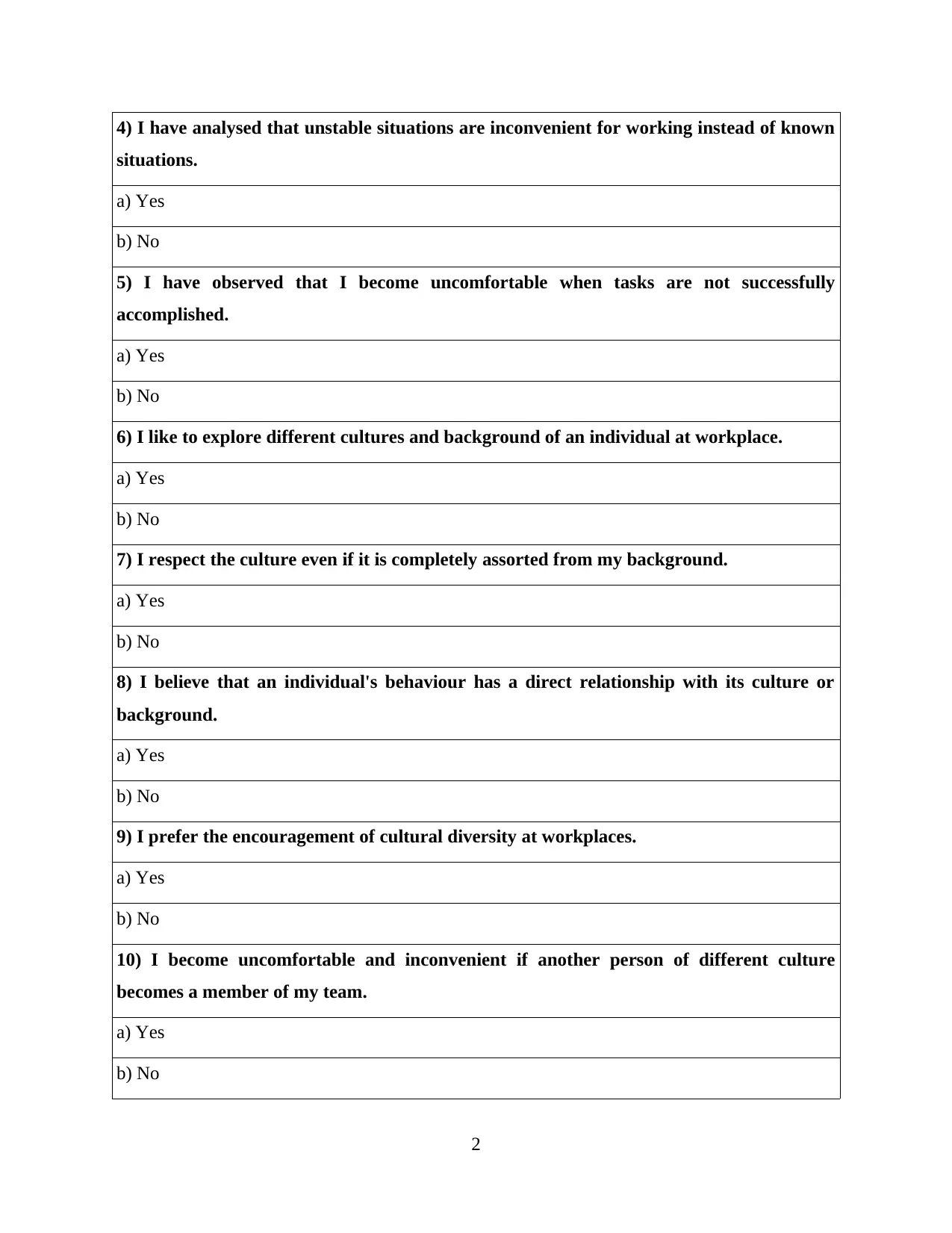
4) I have analysed that unstable situations are inconvenient for working instead of known
situations.
a) Yes
b) No
5) I have observed that I become uncomfortable when tasks are not successfully
accomplished.
a) Yes
b) No
6) I like to explore different cultures and background of an individual at workplace.
a) Yes
b) No
7) I respect the culture even if it is completely assorted from my background.
a) Yes
b) No
8) I believe that an individual's behaviour has a direct relationship with its culture or
background.
a) Yes
b) No
9) I prefer the encouragement of cultural diversity at workplaces.
a) Yes
b) No
10) I become uncomfortable and inconvenient if another person of different culture
becomes a member of my team.
a) Yes
b) No
2
situations.
a) Yes
b) No
5) I have observed that I become uncomfortable when tasks are not successfully
accomplished.
a) Yes
b) No
6) I like to explore different cultures and background of an individual at workplace.
a) Yes
b) No
7) I respect the culture even if it is completely assorted from my background.
a) Yes
b) No
8) I believe that an individual's behaviour has a direct relationship with its culture or
background.
a) Yes
b) No
9) I prefer the encouragement of cultural diversity at workplaces.
a) Yes
b) No
10) I become uncomfortable and inconvenient if another person of different culture
becomes a member of my team.
a) Yes
b) No
2
Secure Best Marks with AI Grader
Need help grading? Try our AI Grader for instant feedback on your assignments.
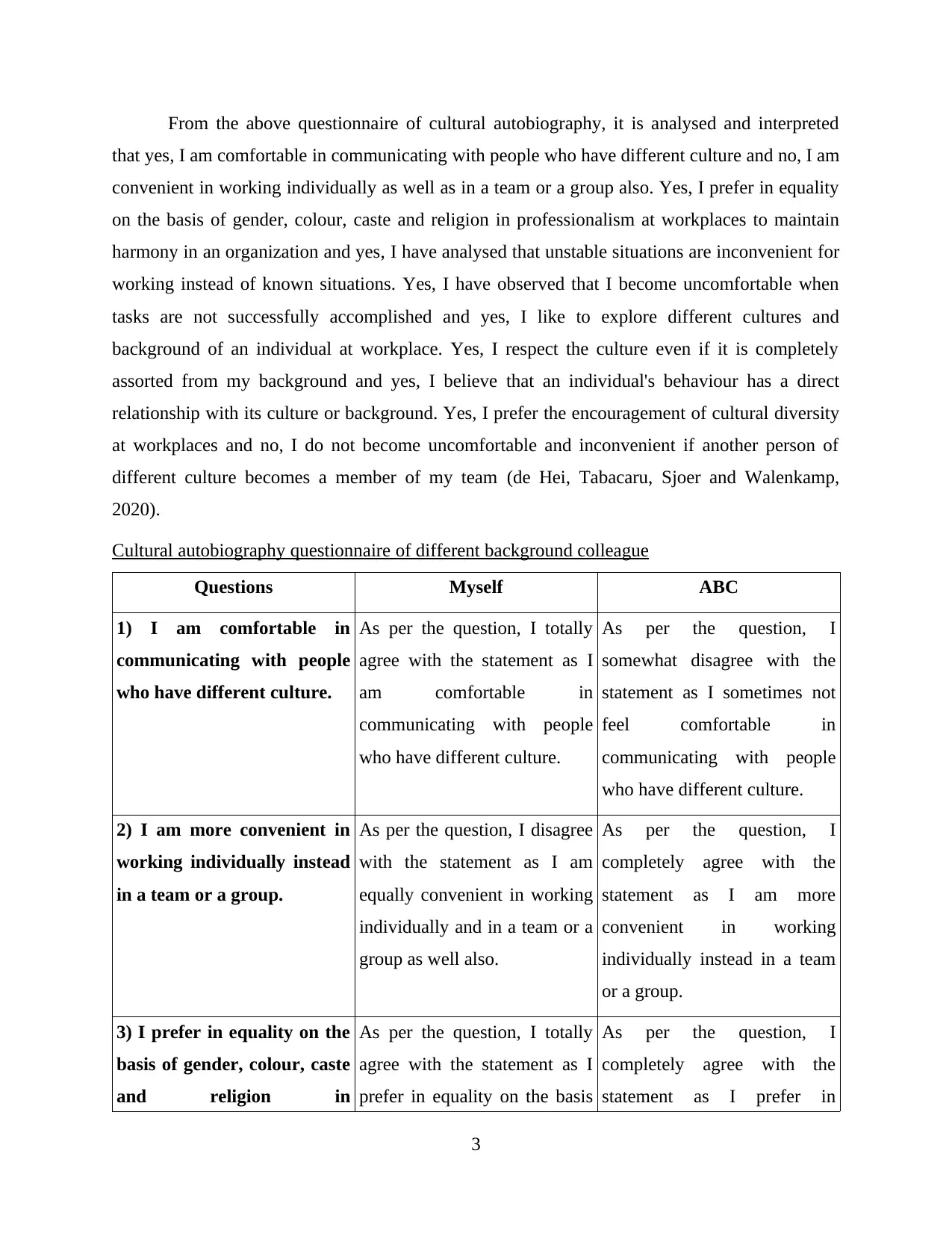
From the above questionnaire of cultural autobiography, it is analysed and interpreted
that yes, I am comfortable in communicating with people who have different culture and no, I am
convenient in working individually as well as in a team or a group also. Yes, I prefer in equality
on the basis of gender, colour, caste and religion in professionalism at workplaces to maintain
harmony in an organization and yes, I have analysed that unstable situations are inconvenient for
working instead of known situations. Yes, I have observed that I become uncomfortable when
tasks are not successfully accomplished and yes, I like to explore different cultures and
background of an individual at workplace. Yes, I respect the culture even if it is completely
assorted from my background and yes, I believe that an individual's behaviour has a direct
relationship with its culture or background. Yes, I prefer the encouragement of cultural diversity
at workplaces and no, I do not become uncomfortable and inconvenient if another person of
different culture becomes a member of my team (de Hei, Tabacaru, Sjoer and Walenkamp,
2020).
Cultural autobiography questionnaire of different background colleague
Questions Myself ABC
1) I am comfortable in
communicating with people
who have different culture.
As per the question, I totally
agree with the statement as I
am comfortable in
communicating with people
who have different culture.
As per the question, I
somewhat disagree with the
statement as I sometimes not
feel comfortable in
communicating with people
who have different culture.
2) I am more convenient in
working individually instead
in a team or a group.
As per the question, I disagree
with the statement as I am
equally convenient in working
individually and in a team or a
group as well also.
As per the question, I
completely agree with the
statement as I am more
convenient in working
individually instead in a team
or a group.
3) I prefer in equality on the
basis of gender, colour, caste
and religion in
As per the question, I totally
agree with the statement as I
prefer in equality on the basis
As per the question, I
completely agree with the
statement as I prefer in
3
that yes, I am comfortable in communicating with people who have different culture and no, I am
convenient in working individually as well as in a team or a group also. Yes, I prefer in equality
on the basis of gender, colour, caste and religion in professionalism at workplaces to maintain
harmony in an organization and yes, I have analysed that unstable situations are inconvenient for
working instead of known situations. Yes, I have observed that I become uncomfortable when
tasks are not successfully accomplished and yes, I like to explore different cultures and
background of an individual at workplace. Yes, I respect the culture even if it is completely
assorted from my background and yes, I believe that an individual's behaviour has a direct
relationship with its culture or background. Yes, I prefer the encouragement of cultural diversity
at workplaces and no, I do not become uncomfortable and inconvenient if another person of
different culture becomes a member of my team (de Hei, Tabacaru, Sjoer and Walenkamp,
2020).
Cultural autobiography questionnaire of different background colleague
Questions Myself ABC
1) I am comfortable in
communicating with people
who have different culture.
As per the question, I totally
agree with the statement as I
am comfortable in
communicating with people
who have different culture.
As per the question, I
somewhat disagree with the
statement as I sometimes not
feel comfortable in
communicating with people
who have different culture.
2) I am more convenient in
working individually instead
in a team or a group.
As per the question, I disagree
with the statement as I am
equally convenient in working
individually and in a team or a
group as well also.
As per the question, I
completely agree with the
statement as I am more
convenient in working
individually instead in a team
or a group.
3) I prefer in equality on the
basis of gender, colour, caste
and religion in
As per the question, I totally
agree with the statement as I
prefer in equality on the basis
As per the question, I
completely agree with the
statement as I prefer in
3
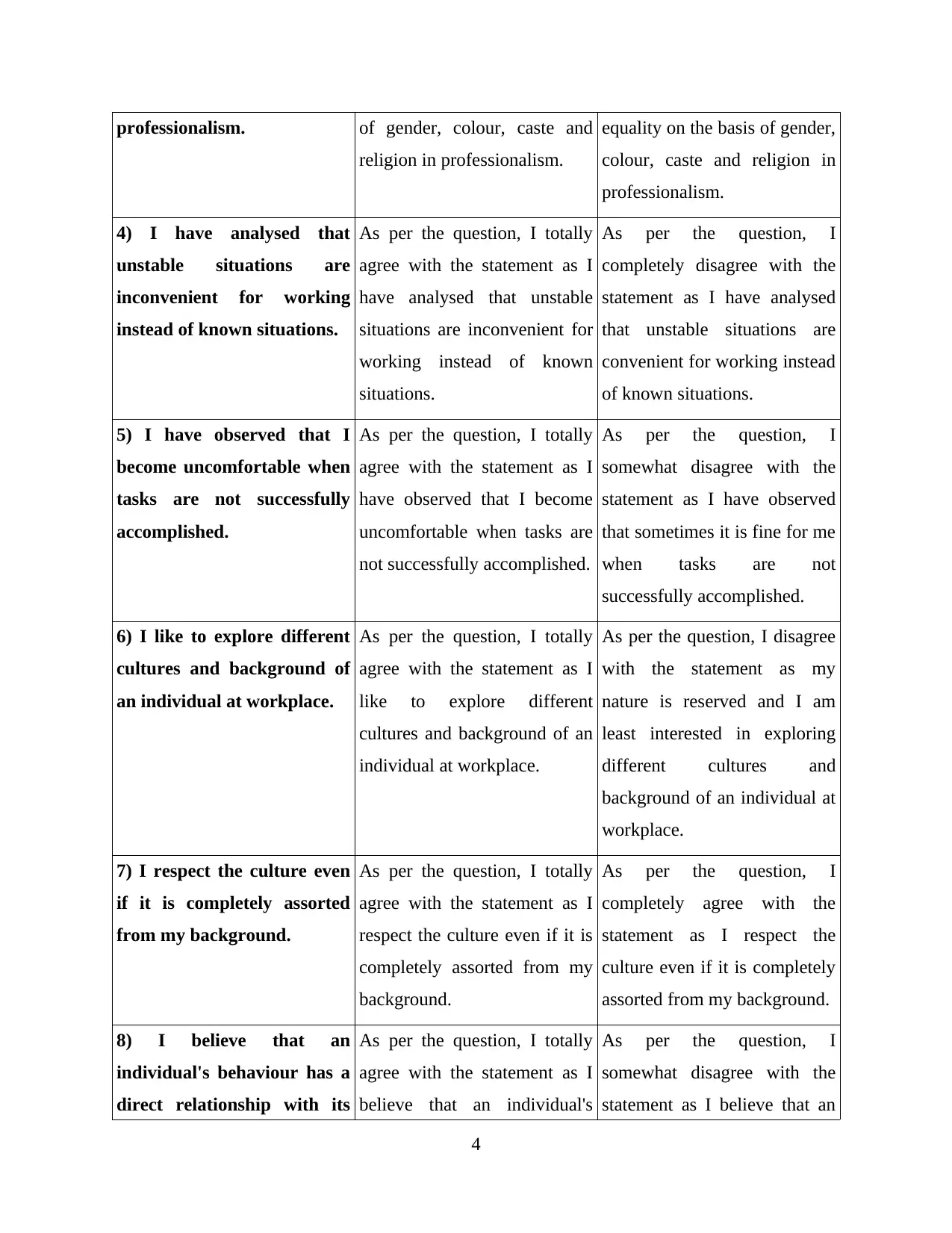
professionalism. of gender, colour, caste and
religion in professionalism.
equality on the basis of gender,
colour, caste and religion in
professionalism.
4) I have analysed that
unstable situations are
inconvenient for working
instead of known situations.
As per the question, I totally
agree with the statement as I
have analysed that unstable
situations are inconvenient for
working instead of known
situations.
As per the question, I
completely disagree with the
statement as I have analysed
that unstable situations are
convenient for working instead
of known situations.
5) I have observed that I
become uncomfortable when
tasks are not successfully
accomplished.
As per the question, I totally
agree with the statement as I
have observed that I become
uncomfortable when tasks are
not successfully accomplished.
As per the question, I
somewhat disagree with the
statement as I have observed
that sometimes it is fine for me
when tasks are not
successfully accomplished.
6) I like to explore different
cultures and background of
an individual at workplace.
As per the question, I totally
agree with the statement as I
like to explore different
cultures and background of an
individual at workplace.
As per the question, I disagree
with the statement as my
nature is reserved and I am
least interested in exploring
different cultures and
background of an individual at
workplace.
7) I respect the culture even
if it is completely assorted
from my background.
As per the question, I totally
agree with the statement as I
respect the culture even if it is
completely assorted from my
background.
As per the question, I
completely agree with the
statement as I respect the
culture even if it is completely
assorted from my background.
8) I believe that an
individual's behaviour has a
direct relationship with its
As per the question, I totally
agree with the statement as I
believe that an individual's
As per the question, I
somewhat disagree with the
statement as I believe that an
4
religion in professionalism.
equality on the basis of gender,
colour, caste and religion in
professionalism.
4) I have analysed that
unstable situations are
inconvenient for working
instead of known situations.
As per the question, I totally
agree with the statement as I
have analysed that unstable
situations are inconvenient for
working instead of known
situations.
As per the question, I
completely disagree with the
statement as I have analysed
that unstable situations are
convenient for working instead
of known situations.
5) I have observed that I
become uncomfortable when
tasks are not successfully
accomplished.
As per the question, I totally
agree with the statement as I
have observed that I become
uncomfortable when tasks are
not successfully accomplished.
As per the question, I
somewhat disagree with the
statement as I have observed
that sometimes it is fine for me
when tasks are not
successfully accomplished.
6) I like to explore different
cultures and background of
an individual at workplace.
As per the question, I totally
agree with the statement as I
like to explore different
cultures and background of an
individual at workplace.
As per the question, I disagree
with the statement as my
nature is reserved and I am
least interested in exploring
different cultures and
background of an individual at
workplace.
7) I respect the culture even
if it is completely assorted
from my background.
As per the question, I totally
agree with the statement as I
respect the culture even if it is
completely assorted from my
background.
As per the question, I
completely agree with the
statement as I respect the
culture even if it is completely
assorted from my background.
8) I believe that an
individual's behaviour has a
direct relationship with its
As per the question, I totally
agree with the statement as I
believe that an individual's
As per the question, I
somewhat disagree with the
statement as I believe that an
4
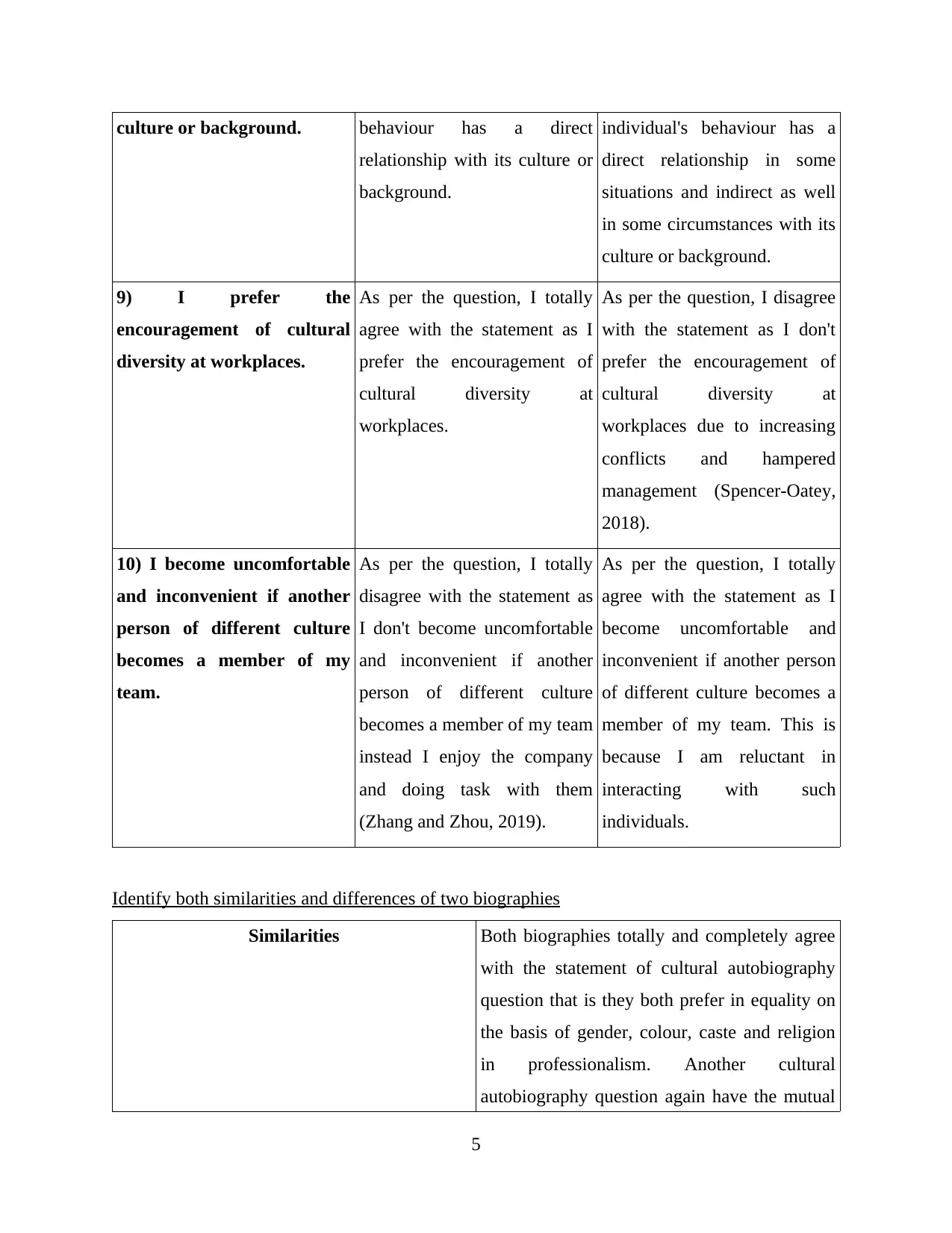
culture or background. behaviour has a direct
relationship with its culture or
background.
individual's behaviour has a
direct relationship in some
situations and indirect as well
in some circumstances with its
culture or background.
9) I prefer the
encouragement of cultural
diversity at workplaces.
As per the question, I totally
agree with the statement as I
prefer the encouragement of
cultural diversity at
workplaces.
As per the question, I disagree
with the statement as I don't
prefer the encouragement of
cultural diversity at
workplaces due to increasing
conflicts and hampered
management (Spencer-Oatey,
2018).
10) I become uncomfortable
and inconvenient if another
person of different culture
becomes a member of my
team.
As per the question, I totally
disagree with the statement as
I don't become uncomfortable
and inconvenient if another
person of different culture
becomes a member of my team
instead I enjoy the company
and doing task with them
(Zhang and Zhou, 2019).
As per the question, I totally
agree with the statement as I
become uncomfortable and
inconvenient if another person
of different culture becomes a
member of my team. This is
because I am reluctant in
interacting with such
individuals.
Identify both similarities and differences of two biographies
Similarities Both biographies totally and completely agree
with the statement of cultural autobiography
question that is they both prefer in equality on
the basis of gender, colour, caste and religion
in professionalism. Another cultural
autobiography question again have the mutual
5
relationship with its culture or
background.
individual's behaviour has a
direct relationship in some
situations and indirect as well
in some circumstances with its
culture or background.
9) I prefer the
encouragement of cultural
diversity at workplaces.
As per the question, I totally
agree with the statement as I
prefer the encouragement of
cultural diversity at
workplaces.
As per the question, I disagree
with the statement as I don't
prefer the encouragement of
cultural diversity at
workplaces due to increasing
conflicts and hampered
management (Spencer-Oatey,
2018).
10) I become uncomfortable
and inconvenient if another
person of different culture
becomes a member of my
team.
As per the question, I totally
disagree with the statement as
I don't become uncomfortable
and inconvenient if another
person of different culture
becomes a member of my team
instead I enjoy the company
and doing task with them
(Zhang and Zhou, 2019).
As per the question, I totally
agree with the statement as I
become uncomfortable and
inconvenient if another person
of different culture becomes a
member of my team. This is
because I am reluctant in
interacting with such
individuals.
Identify both similarities and differences of two biographies
Similarities Both biographies totally and completely agree
with the statement of cultural autobiography
question that is they both prefer in equality on
the basis of gender, colour, caste and religion
in professionalism. Another cultural
autobiography question again have the mutual
5
Paraphrase This Document
Need a fresh take? Get an instant paraphrase of this document with our AI Paraphraser
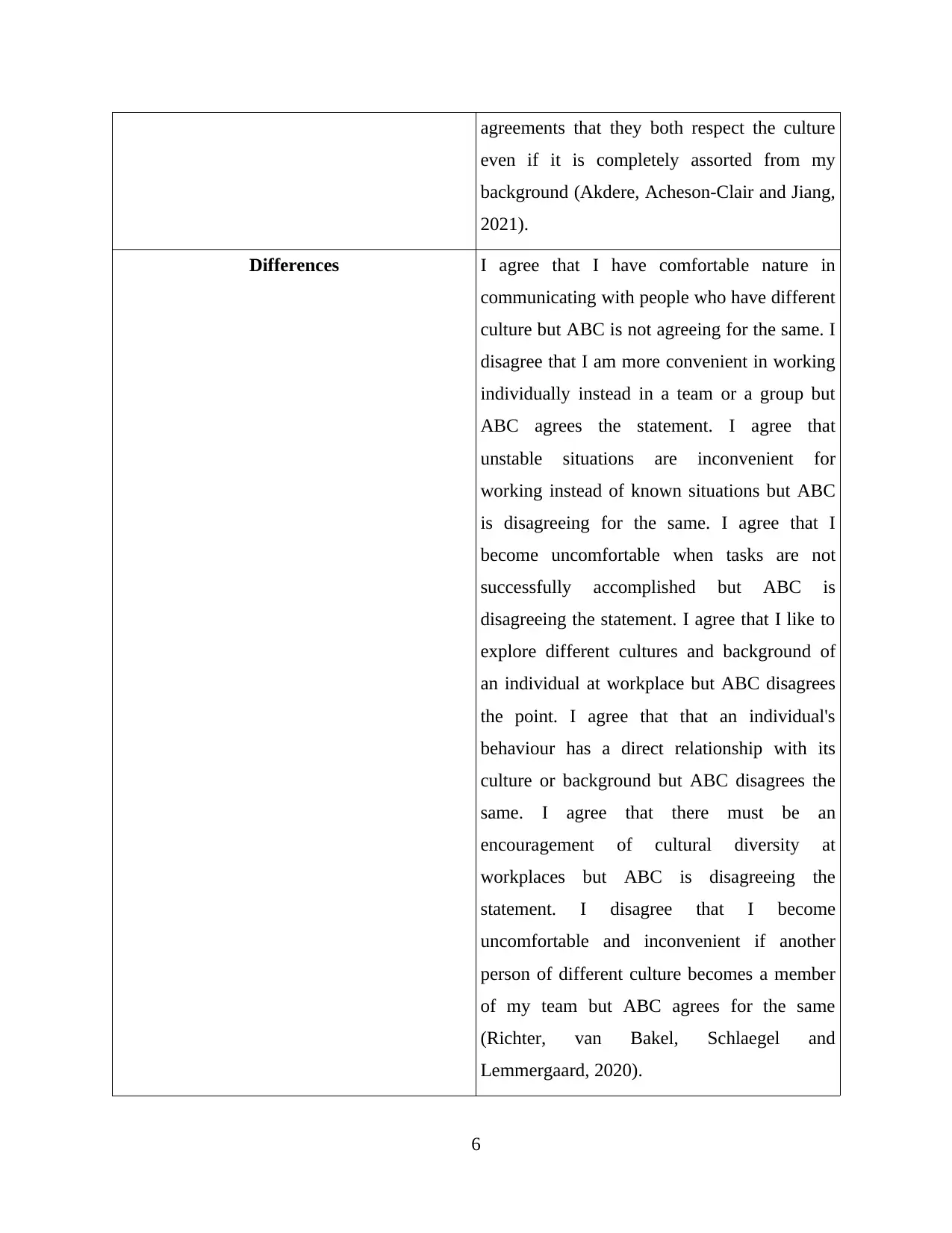
agreements that they both respect the culture
even if it is completely assorted from my
background (Akdere, Acheson-Clair and Jiang,
2021).
Differences I agree that I have comfortable nature in
communicating with people who have different
culture but ABC is not agreeing for the same. I
disagree that I am more convenient in working
individually instead in a team or a group but
ABC agrees the statement. I agree that
unstable situations are inconvenient for
working instead of known situations but ABC
is disagreeing for the same. I agree that I
become uncomfortable when tasks are not
successfully accomplished but ABC is
disagreeing the statement. I agree that I like to
explore different cultures and background of
an individual at workplace but ABC disagrees
the point. I agree that that an individual's
behaviour has a direct relationship with its
culture or background but ABC disagrees the
same. I agree that there must be an
encouragement of cultural diversity at
workplaces but ABC is disagreeing the
statement. I disagree that I become
uncomfortable and inconvenient if another
person of different culture becomes a member
of my team but ABC agrees for the same
(Richter, van Bakel, Schlaegel and
Lemmergaard, 2020).
6
even if it is completely assorted from my
background (Akdere, Acheson-Clair and Jiang,
2021).
Differences I agree that I have comfortable nature in
communicating with people who have different
culture but ABC is not agreeing for the same. I
disagree that I am more convenient in working
individually instead in a team or a group but
ABC agrees the statement. I agree that
unstable situations are inconvenient for
working instead of known situations but ABC
is disagreeing for the same. I agree that I
become uncomfortable when tasks are not
successfully accomplished but ABC is
disagreeing the statement. I agree that I like to
explore different cultures and background of
an individual at workplace but ABC disagrees
the point. I agree that that an individual's
behaviour has a direct relationship with its
culture or background but ABC disagrees the
same. I agree that there must be an
encouragement of cultural diversity at
workplaces but ABC is disagreeing the
statement. I disagree that I become
uncomfortable and inconvenient if another
person of different culture becomes a member
of my team but ABC agrees for the same
(Richter, van Bakel, Schlaegel and
Lemmergaard, 2020).
6
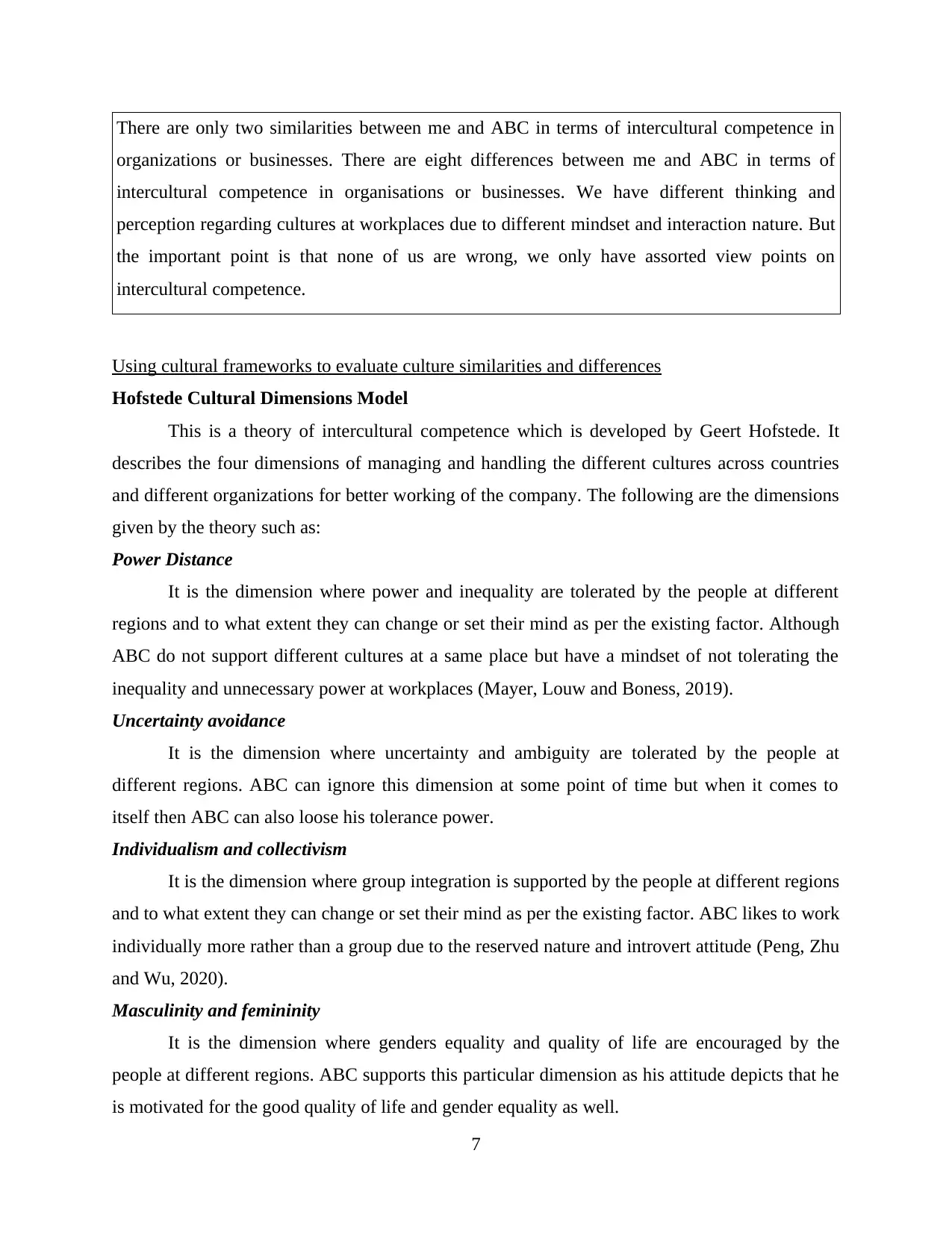
There are only two similarities between me and ABC in terms of intercultural competence in
organizations or businesses. There are eight differences between me and ABC in terms of
intercultural competence in organisations or businesses. We have different thinking and
perception regarding cultures at workplaces due to different mindset and interaction nature. But
the important point is that none of us are wrong, we only have assorted view points on
intercultural competence.
Using cultural frameworks to evaluate culture similarities and differences
Hofstede Cultural Dimensions Model
This is a theory of intercultural competence which is developed by Geert Hofstede. It
describes the four dimensions of managing and handling the different cultures across countries
and different organizations for better working of the company. The following are the dimensions
given by the theory such as:
Power Distance
It is the dimension where power and inequality are tolerated by the people at different
regions and to what extent they can change or set their mind as per the existing factor. Although
ABC do not support different cultures at a same place but have a mindset of not tolerating the
inequality and unnecessary power at workplaces (Mayer, Louw and Boness, 2019).
Uncertainty avoidance
It is the dimension where uncertainty and ambiguity are tolerated by the people at
different regions. ABC can ignore this dimension at some point of time but when it comes to
itself then ABC can also loose his tolerance power.
Individualism and collectivism
It is the dimension where group integration is supported by the people at different regions
and to what extent they can change or set their mind as per the existing factor. ABC likes to work
individually more rather than a group due to the reserved nature and introvert attitude (Peng, Zhu
and Wu, 2020).
Masculinity and femininity
It is the dimension where genders equality and quality of life are encouraged by the
people at different regions. ABC supports this particular dimension as his attitude depicts that he
is motivated for the good quality of life and gender equality as well.
7
organizations or businesses. There are eight differences between me and ABC in terms of
intercultural competence in organisations or businesses. We have different thinking and
perception regarding cultures at workplaces due to different mindset and interaction nature. But
the important point is that none of us are wrong, we only have assorted view points on
intercultural competence.
Using cultural frameworks to evaluate culture similarities and differences
Hofstede Cultural Dimensions Model
This is a theory of intercultural competence which is developed by Geert Hofstede. It
describes the four dimensions of managing and handling the different cultures across countries
and different organizations for better working of the company. The following are the dimensions
given by the theory such as:
Power Distance
It is the dimension where power and inequality are tolerated by the people at different
regions and to what extent they can change or set their mind as per the existing factor. Although
ABC do not support different cultures at a same place but have a mindset of not tolerating the
inequality and unnecessary power at workplaces (Mayer, Louw and Boness, 2019).
Uncertainty avoidance
It is the dimension where uncertainty and ambiguity are tolerated by the people at
different regions. ABC can ignore this dimension at some point of time but when it comes to
itself then ABC can also loose his tolerance power.
Individualism and collectivism
It is the dimension where group integration is supported by the people at different regions
and to what extent they can change or set their mind as per the existing factor. ABC likes to work
individually more rather than a group due to the reserved nature and introvert attitude (Peng, Zhu
and Wu, 2020).
Masculinity and femininity
It is the dimension where genders equality and quality of life are encouraged by the
people at different regions. ABC supports this particular dimension as his attitude depicts that he
is motivated for the good quality of life and gender equality as well.
7
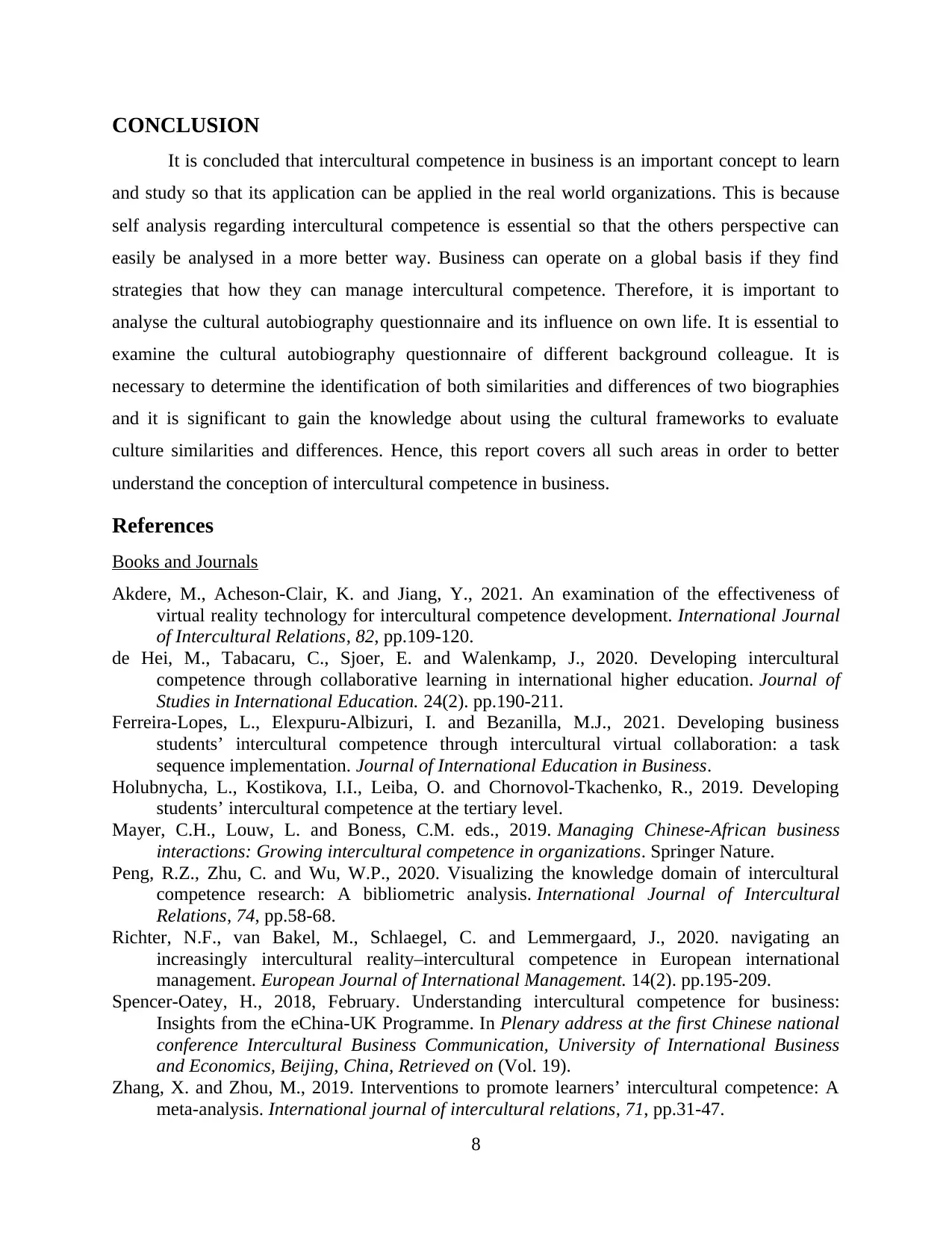
CONCLUSION
It is concluded that intercultural competence in business is an important concept to learn
and study so that its application can be applied in the real world organizations. This is because
self analysis regarding intercultural competence is essential so that the others perspective can
easily be analysed in a more better way. Business can operate on a global basis if they find
strategies that how they can manage intercultural competence. Therefore, it is important to
analyse the cultural autobiography questionnaire and its influence on own life. It is essential to
examine the cultural autobiography questionnaire of different background colleague. It is
necessary to determine the identification of both similarities and differences of two biographies
and it is significant to gain the knowledge about using the cultural frameworks to evaluate
culture similarities and differences. Hence, this report covers all such areas in order to better
understand the conception of intercultural competence in business.
References
Books and Journals
Akdere, M., Acheson-Clair, K. and Jiang, Y., 2021. An examination of the effectiveness of
virtual reality technology for intercultural competence development. International Journal
of Intercultural Relations, 82, pp.109-120.
de Hei, M., Tabacaru, C., Sjoer, E. and Walenkamp, J., 2020. Developing intercultural
competence through collaborative learning in international higher education. Journal of
Studies in International Education. 24(2). pp.190-211.
Ferreira-Lopes, L., Elexpuru-Albizuri, I. and Bezanilla, M.J., 2021. Developing business
students’ intercultural competence through intercultural virtual collaboration: a task
sequence implementation. Journal of International Education in Business.
Holubnycha, L., Kostikova, I.І., Leiba, O. and Chornovol-Tkachenko, R., 2019. Developing
students’ intercultural competence at the tertiary level.
Mayer, C.H., Louw, L. and Boness, C.M. eds., 2019. Managing Chinese-African business
interactions: Growing intercultural competence in organizations. Springer Nature.
Peng, R.Z., Zhu, C. and Wu, W.P., 2020. Visualizing the knowledge domain of intercultural
competence research: A bibliometric analysis. International Journal of Intercultural
Relations, 74, pp.58-68.
Richter, N.F., van Bakel, M., Schlaegel, C. and Lemmergaard, J., 2020. navigating an
increasingly intercultural reality–intercultural competence in European international
management. European Journal of International Management. 14(2). pp.195-209.
Spencer-Oatey, H., 2018, February. Understanding intercultural competence for business:
Insights from the eChina-UK Programme. In Plenary address at the first Chinese national
conference Intercultural Business Communication, University of International Business
and Economics, Beijing, China, Retrieved on (Vol. 19).
Zhang, X. and Zhou, M., 2019. Interventions to promote learners’ intercultural competence: A
meta-analysis. International journal of intercultural relations, 71, pp.31-47.
8
It is concluded that intercultural competence in business is an important concept to learn
and study so that its application can be applied in the real world organizations. This is because
self analysis regarding intercultural competence is essential so that the others perspective can
easily be analysed in a more better way. Business can operate on a global basis if they find
strategies that how they can manage intercultural competence. Therefore, it is important to
analyse the cultural autobiography questionnaire and its influence on own life. It is essential to
examine the cultural autobiography questionnaire of different background colleague. It is
necessary to determine the identification of both similarities and differences of two biographies
and it is significant to gain the knowledge about using the cultural frameworks to evaluate
culture similarities and differences. Hence, this report covers all such areas in order to better
understand the conception of intercultural competence in business.
References
Books and Journals
Akdere, M., Acheson-Clair, K. and Jiang, Y., 2021. An examination of the effectiveness of
virtual reality technology for intercultural competence development. International Journal
of Intercultural Relations, 82, pp.109-120.
de Hei, M., Tabacaru, C., Sjoer, E. and Walenkamp, J., 2020. Developing intercultural
competence through collaborative learning in international higher education. Journal of
Studies in International Education. 24(2). pp.190-211.
Ferreira-Lopes, L., Elexpuru-Albizuri, I. and Bezanilla, M.J., 2021. Developing business
students’ intercultural competence through intercultural virtual collaboration: a task
sequence implementation. Journal of International Education in Business.
Holubnycha, L., Kostikova, I.І., Leiba, O. and Chornovol-Tkachenko, R., 2019. Developing
students’ intercultural competence at the tertiary level.
Mayer, C.H., Louw, L. and Boness, C.M. eds., 2019. Managing Chinese-African business
interactions: Growing intercultural competence in organizations. Springer Nature.
Peng, R.Z., Zhu, C. and Wu, W.P., 2020. Visualizing the knowledge domain of intercultural
competence research: A bibliometric analysis. International Journal of Intercultural
Relations, 74, pp.58-68.
Richter, N.F., van Bakel, M., Schlaegel, C. and Lemmergaard, J., 2020. navigating an
increasingly intercultural reality–intercultural competence in European international
management. European Journal of International Management. 14(2). pp.195-209.
Spencer-Oatey, H., 2018, February. Understanding intercultural competence for business:
Insights from the eChina-UK Programme. In Plenary address at the first Chinese national
conference Intercultural Business Communication, University of International Business
and Economics, Beijing, China, Retrieved on (Vol. 19).
Zhang, X. and Zhou, M., 2019. Interventions to promote learners’ intercultural competence: A
meta-analysis. International journal of intercultural relations, 71, pp.31-47.
8
1 out of 10
Your All-in-One AI-Powered Toolkit for Academic Success.
+13062052269
info@desklib.com
Available 24*7 on WhatsApp / Email
![[object Object]](/_next/static/media/star-bottom.7253800d.svg)
Unlock your academic potential
© 2024 | Zucol Services PVT LTD | All rights reserved.



